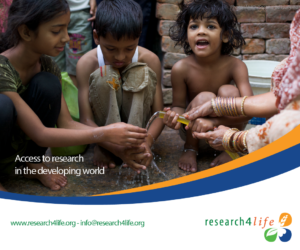Editor’s Note: Today’s post is by Domiziana Francescon. Domiziana is the Co-Chair of the Communications team of Research4Life, a UN-publisher partnership to bridge access gaps for researchers and doctors in developing countries. She is also the Elsevier Foundation Partnerships Manager.
Access to research knowledge is essential for developing new research and for informed policy decisions. But access to knowledge is not equal around the world; researchers in low- and middle-income countries (LMICs) are significantly disadvantaged by access challenges.
This was the burning problem that Research4Life was set up to address, 20 years ago this year as the print to electronic migration was just gaining speed. Launched as Hinari by the World Health Organization (WHO) with 1500 journals from six major publishers, it now offers users up to 132,000 resources from 180 international partners. But partnering with publishers to facilitate access is not enough in itself; the resources have to be used effectively in a way that is relevant to users’ research, implementation and beyond.
This is why, every five years Research4Life commissions in-depth reviews of its work to understand how the work of the partnership is experienced from the users’ as well as the partners’ perspectives – looking at its infrastructure, external context or landscape, and user experience. Together, the reviews serve as a solid evidence base for future evolution as Research4Life plans its strategy for the next five years. Our most recent set of evaluations were conducted in 2020-2021.

Views from the research and scholarly landscape
The first step was a Landscape and Situation Analysis conducted by Research Consulting. This takes into account the most recent shifts in scholarly communication and development research, with an eye to the key issue of equitable access to research. This analysis was an important step because Research4Life doesn’t exist in isolation; the researchers who can use Research4Life programs also work within the wider global research and publishing context, with different sources of information and different routes to sharing their research.
The landscape analysis highlighted and analyzed three overarching factors that can be seen as priority contextual themes for Research4Life:
- Growth in Global South research: research in LMICs is growing both in terms of the total amount of money invested in R&D and the total number of researchers that need access to scholarly literature and research data. There is growing demand for researcher training and a persistent research funding gap vs. high-income countries.
- The rise of Open Access (OA): OA is changing the amount of literature that is freely available to LMIC researchers, as well as publishing business models. The growth of OA creates both new possibilities and new challenges to equitable access to publishing, and to Research4Life’s value to its stakeholders and users.
- Workflows changes: There is a proliferation of new and innovative ways to support the research information management needs. As the technology continues to improve, Research4Life needs to take into account how to keep abreast of these developments in the ways it advances its interface.
Views from the field: the user experience
The User Experience Review completed by INASP (full disclosure: Scholarly Kitchen Chef Siân Harris was one of the researchers on this review) shows similar trends. 97% of survey respondents found Research4Life valuable for their career; for 87% it improves the quality of their research, and 86% feel that it improves their research skills. However, while the Research4Life programs are relevant and effective sources for users who are aware of them and received appropriate training, overall usage remains limited. The review, conducted through interviews, focus groups, and a survey, in multiple languages, points at awareness as the most significant factors in usage. It also provides insights into the growing Open Access landscape and learnings around the pandemic context.
- Community engagement and sense of ownership
Feeling part of a group is a powerful driver, and the review highlights the role communities can play in the broader Research4Life usage. 96% of respondents indicated community as very important, and many mentioned librarian colleagues who are strong champions of the initiative. Beyond that, library consortia can help bring together different perspectives and initiatives, and inter-institutional networks and ministerial-level buy-in are ranked high for building awareness and sharing of information.
As one survey respondent from Nigeria noted, “There should be partnership with regional bodies like AfLLIP [Association of African Law Library and Information Professionals] to target core professionals for training purposes. Such partnership will increase the skills of these professionals to be able to access the database and give these professionals a sense that they truly belong a global community.”
The review found that universities are the most likely to undertake ongoing promotion – often through email, or social media (WhatsApp and Facebook were mentioned specifically). A researcher from Mozambique said, “We have focal people who usually do awareness raising, and generally, when there is any new initiative from Research4life, they usually send out emails and put the information on the notice board for the entire academic community in the University.”
A survey respondent from Nigeria noted, “A sense of community could be achieved through combined trainings such as MOOCs, physical regional and or local trainings, group work delegation requiring members to work together and interact, group projects that necessitate drawing group members from across the globe, and blends of varying academic qualifications and professionals.”
To respond to the need for on-the-ground community engagement, Research4Life is developing a “Country Connectors” proof of concept project. The Connectors will act as focal points to foster collaboration in a number of pilot countries both with the user communities and at strategic regional and national level – building on their knowledge of the local research environment and assisting Research4Life with insights and recommendations. Such an ambitious program will need financial support and a sustainability strategy to ensure its long-term success.
Partners can also play a strong role in tackling low usage and increase Research4Life’s potential in addressing a global access need – for example, by tapping their own community of librarians, authors and researchers. Earlier in 2021 Research4Life published a set of resources for partners designed to make it easier for them to talk about their involvement in Research4Life. The toolkit provides templates for social media posts as well as blogs and newsletters, logos, photographs and presentations.
- Equitable Open Access and the Global South
Among participants in the user review there was limited understanding, and some misunderstanding, about the concept of OA publishing, and the relationship between Open Access and Research4Life.
Some interviewees and survey respondents (48%) equated the free-at-the-point-of-use availability of content through Research4Life as being the same as OA, while others see it as unrelated. Understanding of Open Access was generally higher amongst librarians than researchers or managers, and, in general, attitudes varied. “I think Open Access is just for reference, I don’t think it would be accepted in research…. People normally don’t trust the [Open Access] information … I think Research4Life should not have Open Access materials,” said a Librarian from Vietnam. In Ukraine, a Researcher noted instead, “I’m on the side of Open Access. It’s beneficial to everyone. In Ukraine it’s a big problem to buy articles because the government doesn’t really support us. I see Research4Life as Open Access. Research4Life is the same as Open Access because you can read and download … For me it is the best option because science should be open.”
For some users, there is a role for Research4Life to play in helping them navigate the OA landscape. For example, in an optional survey question about what role Research4Life could play in supporting OA, 33% of respondents believe the most important role for Research4Life would be developing technology solutions so that relevant waivers are automatically applied to researchers logged into Research4Life when submitting articles.
There is also strong support for Research4Life to play an advocacy role in encouraging publishers to be more consistent and transparent with their approaches to APC waivers. “Research4Life can take up the role of negotiating for waivers and publishers, the same way you’re negotiating for free options now you can negotiate for waivers and then now be the in between for these APCs,” commented a Librarian from Kenya.
The partnership’s Open Access Taskforce has worked with a group of international publishers, as well as user representatives, to develop a series of best practices to help publishers communicate about their OA policies and waivers – and has compiled an ever-growing index of publisher policies to support users navigating the OA landscape and grappling with guidelines that are often complex and differ from publisher to publisher. Transparency in waiver policy also means that fewer researchers resort to predatory publishing as a result of confusion over OA options. In turn, fair access open doors for publications to attract diverse authors and build a research ecosystem that is truly equitable for all. However, it is worth noting that at a recent Research4Life stakeholders meeting, partners debated whether Open Access was a discussion Research4Life should actively take part in, or whether the partnership should prioritize other core aspects of the work, such as training and capacity building.
- Responding to crises
In additional to the wider context shifts and overall Research4Life experiences, the User Experience Review was delivered during a global pandemic. While this posed unique challenges to the research process, with interviews and focus groups all conducted virtually, it has also offered some additional insight into the impact of major disruption on the usage of Research4Life programs. This may help with understanding the impact of more localized disruption caused by, for example, natural disasters or conflict as well as public health crises.
When the pandemic hit, it didn’t affect the whole Research4Life community in the same way. While round 23% of survey respondents found it easier to use Research4Life, 26% found it harder: some of the issues are related to an increased burden of family care, lack of support within institutions, technology issues, and more. “Classes are now online, which has increased the demand for online information, and this is where Research4life use is most necessary. But its restricted use causes a negative impact: our users cannot access this information from their homes since Research4life works with the university’s IP,” said a Librarian from Nicaragua.
For some users, the pandemic also presented additional time for research: it gave them an opportunity to join a monthly series of webinars highlighting resources and platforms available to users, or to enroll in Research4Life’s Massive Open Online Course, which has reached more than 5000 users since 2019. “The most important use of the databases was in the COVID-19 confinement period where I was able to use my Research4Life password to access at home. I have done good research for me and my PhD students,” commented a Professor in Tunisia.
Additionally, in an effort to ensure the broadest possible access to the extensive resources available through Research4Life, in 2020 and 2021 partners have also opened up backfiles that wouldn’t otherwise be available to users, and fees for Group B countries were paused.
Looking at the future: building a sustainable research ecosystem
The UN Sustainable Development Goals emphasize that access to the outputs of research is a catalyst for development, not a goal in its own right. This underlying principle sits at the heart of Research4Life as well: researchers in eligible countries need access to scholarly outputs both to inform their own endeavors and practices, and as a capacity building pathway to bring their own research to the global community.
This greater recognition of the link between research and sustainable development will inform Research4Life’s next strategic cycle, as the partnership taps the wealth of recommendations within the reports to reflect on its ability to fully support capacity building across the research cycle. “Over the next few months, we will be reflecting on how Research4Life can increase its support of inclusive research, in our traditional focus on access and possibly beyond,” said Ylann Schemm, Chair of the Research4Life Executive Council and Director of Corporate Responsibility, Elsevier. One step towards increasing the partnership’s ability to scale up is the newly launched Friends of Research4Life, a non-profit fund-raising vehicle dedicated to increasing the impact of the program and to ensuring the sustainability of the partnership beyond the resources and training it currently offers. Ylann continued, “This is really about increasing impact. Friends of Research4Life will enable us to catalyze support for Research4Life, so that we can scale up the important contributions made over the past two decades in access, information literacy and capacity building in lower income countries. We want to invite like-minded organizations to join us in ramping up support.”
Get involved
Publisher partners are invited to make use of the communications toolkit, and to reach out to the Research4Life Communications team with feedback, comments or requests for marketing material. The Communications team is also the point of contact if you are a Research4Life partner and wish to offer a webinar to the user community.
Contact Andrea Powell, Publisher Coordinator for Research4Life, for more information about the APC waivers guidelines and policies list – as well as to signal interest in joining Research4Life or contributing to Friends of Research4Life.
Discussion
7 Thoughts on "Guest Post — Trends, Challenges, and Needs of Research in the Global South: Learnings as Research4Life Turns 20"
Very important post in the Scholarly Kitchen about Research4Life (R4L). R4L has done so much for the countries they serve and there is much more to do bring quality research to the designated countries but just as important to bring quality research out of these countries.
As the world’s publishers pulled together to open up research for COVID-19 a similar effort for R4L would have a significant impact on scholarly research!
Lee Walton Ed Reiner The Third Chapter Project, Inc. #research #covid #science #researchers #researchers #stem #equality
Very important post in the Scholarly Kitchen about Research4Life (R4L). R4L has done so much for the country’s they serve and there is much more to do bring quality research to the designated countries but just as important to bring quality research out of these countries.
As the world publishers pulled together to open up research for COVID-19 a similar effort for R4L would have a significant impact on scholarly research!
Lee Walton Ed Reiner The Third Chapter Project, Inc. #research #covid #science #researchers #researchers #stem #equality
Two thoughts occured to me reading this post : First the fact that it is written by a person from the Global North. Not that I’m against that ( I have benefited fully from my cooperation with the Global North ) but a scientist who is “down in the trenches” would convey a much realistic outlook than a person who is sitting in his ( her) confortable desk in Paris , London or Berlin. On the other hand ,I think that THE main reason open access has not yielded its full benefits is due , in the Global South , to an unbelievable lack of understanding of the most common concepts of open access by researchers. Open access has become a “trendy” subject and would be PhDs see it the subject to study to get their diplomas.R4L should undertake a thorough investigation on the subject and ask those ” down in the trenches ” to help.
Hello, I completely agree with you that it is vital for thorough consultation with people “down in the trenches” and about the lack of understanding about OA.
I didn’t write this article but I was a researcher on the user review that this article is based on so I thought it might be useful to provide a bit of background.
The R4L user review was a huge project collecting views from across the countries R4L works in through interviews, focus groups and a big survey. All of these were in multiple languages and the researchers who carried out the review were from both South and North; many of the interviewers were from the same country as the people they were interviewing. The review can be read here (warning: it’s long!): https://www.research4life.org/wp-content/uploads/2021/06/2021-R4L-user-review.pdf
The study was about user experiences of R4L, not about OA specifically. We did ask questions about OA in all the elements of the study but found, as you observed in your comment, that in many cases OA was not well understood. In particular there was confusion about whether what R4L provides is or isn’t OA. I completely agree that this needs further study (you might be interested in another piece of recent research about this topic that I was also a researcher on – https://assets.publishing.service.gov.uk/media/5f85aa45e90e0732a2448113/20-10-05_DFID_OA_in_LMICs_-_final_report.pdf). The question that is perhaps still to be answered is whether support to OA should be part of R4L’s remit or whether R4L should continue to focus mainly on its core work.
As the Project Manager for this User Review, I would like to echo Sian’s comments, and thank her again for INASP’s excellent work during challenging times! Indeed, it is clear that more and more researchers in our user institutions are keen to publish their own research as Open Access and are seeking help from places like Research4Life. We are about to launch a survey of our top 750 user institutions to find out what kind of challenges they face in supporting the Open Access ambitions of their researchers and to explore how Research4Life might be able to expand its scope to provide more support. After all, there’s no point removing barriers to access if you’re just moving them to become barriers to publishing opportunity. No-one wants to see a transition to Open Access creating a less equitable system than the current one!
La comunicación en la era de la IV Revolución Industrial. la 5G y la IoT es una pieza clave más aún en tiempos de vejez con pobreza sin fronteras.
The world is changing and change must follow so researchers must adhere to the situation.



